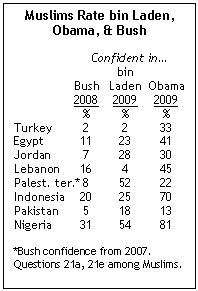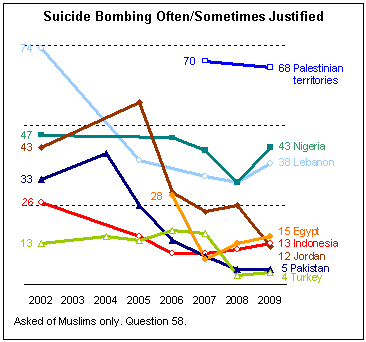
[Webshaykh’s note: On July 23 the Pew Global Attitudes Project issued a report on its survey conducted May 18 to June 16 in 24 countries, including the Palestinian territories. The full report is available as a pdf download and there is a slide presentation available as well. Here is part of the online summary of the report.]
The image of the United States has improved markedly in most parts of the world, reflecting global confidence in Barack Obama. In many countries opinions of the United States are now about as positive as they were at the beginning of the decade before George W. Bush took office. Improvements in the U.S. image have been most pronounced in Western Europe, where favorable ratings for both the nation and the American people have soared. But opinions of America have also become more positive in key countries in Latin America, Africa and Asia, as well.
Signs of improvement in views of America are seen even in some predominantly Muslim countries that held overwhelmingly negative views of the United States in the Bush years. The most notable increase occurred in Indonesia, where people are well aware of Obama’s family ties to the country and where favorable ratings of the U.S. nearly doubled this year. However for the most part, opinions of the U.S. among Muslims in the Middle East remain largely unfavorable, despite some positive movement in the numbers in Jordan and Egypt. Animosity toward the U.S., however, continues to run deep and unabated in Turkey, the Palestinian territories and Pakistan.
Israel stands out in the poll as the only public among the 25 surveyed where the current U.S. rating is lower than in past surveys.1
In contrast, in Germany favorable opinion of the U.S. jumped from 31% in 2008 to 64% in the current survey. Large boosts in U.S. favorability ratings since last year are also recorded in Britain, Spain and France. In its own hemisphere, America’s image rose markedly in Canada, Mexico, Argentina and Brazil. Improvements in U.S. ratings are less evident in countries where the country’s image had not declined consistently during the Bush years, including Poland, Japan and South Korea. Opinions of the U.S. remain very positive in the African nations of Kenya and Nigeria, while increasing significantly in India and China…
Obama’s Cairo Speech

The polling in the Muslim world took place around the time of President Obama’s Cairo speech. In some countries, interviews took place both before and after the speech, providing some gauge of the effect of Obama’s remarks on his image and opinions of the U.S. more broadly. In Turkey a sufficient number of interviews were conducted before and after the speech to allow for an analysis of how much impact it had on public opinion. This analysis suggests that the speech had little measurable impact on views of the U.S. or Obama himself. However, the pre-post comparisons were rudimentary ones that could only have detected a major swing in public opinion.
In Israel and the Palestinian territories full surveys were conducted both before and after the Cairo speech. A pre-post analysis among both publics suggests that Obama’s June 4 speech had a more negative impact on attitudes toward America among Israelis than it had a positive one among Palestinians. Before the speech, 76% of Israelis questioned had a favorable view of the U.S., but after the speech that rating fell to 63%. Similarly, confidence in Obama to do the right thing in world affairs slipped from 60% pre-speech to 49% post-speech.
Among Palestinians, in contrast, overall ratings of the U.S. and Obama improved but only marginally (+5 percentage points), a difference that is not statistically significant. However, one apparently positive consequence of the speech on Palestinian public opinion was observed in the survey. The number of Palestinians thinking that Obama would consider their country’s interests when making international policy rose from 27% to 39%, following the Cairo speech.
Obama vs. bin Laden
More generally, there is little evidence that a more positively regarded U.S. president has spurred further declines in support for terrorism in Muslim countries. Pew Global Attitudes surveys over the last few years have found many fewer Muslims than earlier in the decade saying that suicide bombing and other forms of violence against civilians are justified to defend Islam from its enemies. However, support for suicide bombing has not fallen further over the past year.
Figure
Opinions about Osama bin Laden have followed a similar trend line among the Muslim publics surveyed by the Pew Global Attitudes Project. Views of him have been far more negative in recent years than they were mid-decade, but overall they have not declined further over the past year. However, for the first time over the course of Pew’s surveys, there is more confidence in the American president than in bin Laden in a number of countries with predominantly Muslim publics; including: Turkey, Egypt, Jordan, Nigeria and Indonesia.
In 2008, most Muslim publics rated bin Laden as high, or higher than they rated President Bush. But in the current survey Obama inspires confidence in many more people than does the al Qaeda leader. However, in the Palestinian territories and Pakistan, bin Laden’s ratings still top Obama’s by sizable margins. (Lebanon is the only country in the survey where Bush’s ratings had been higher than bin Laden’s among Muslims in recent years).
For the full article, click here.